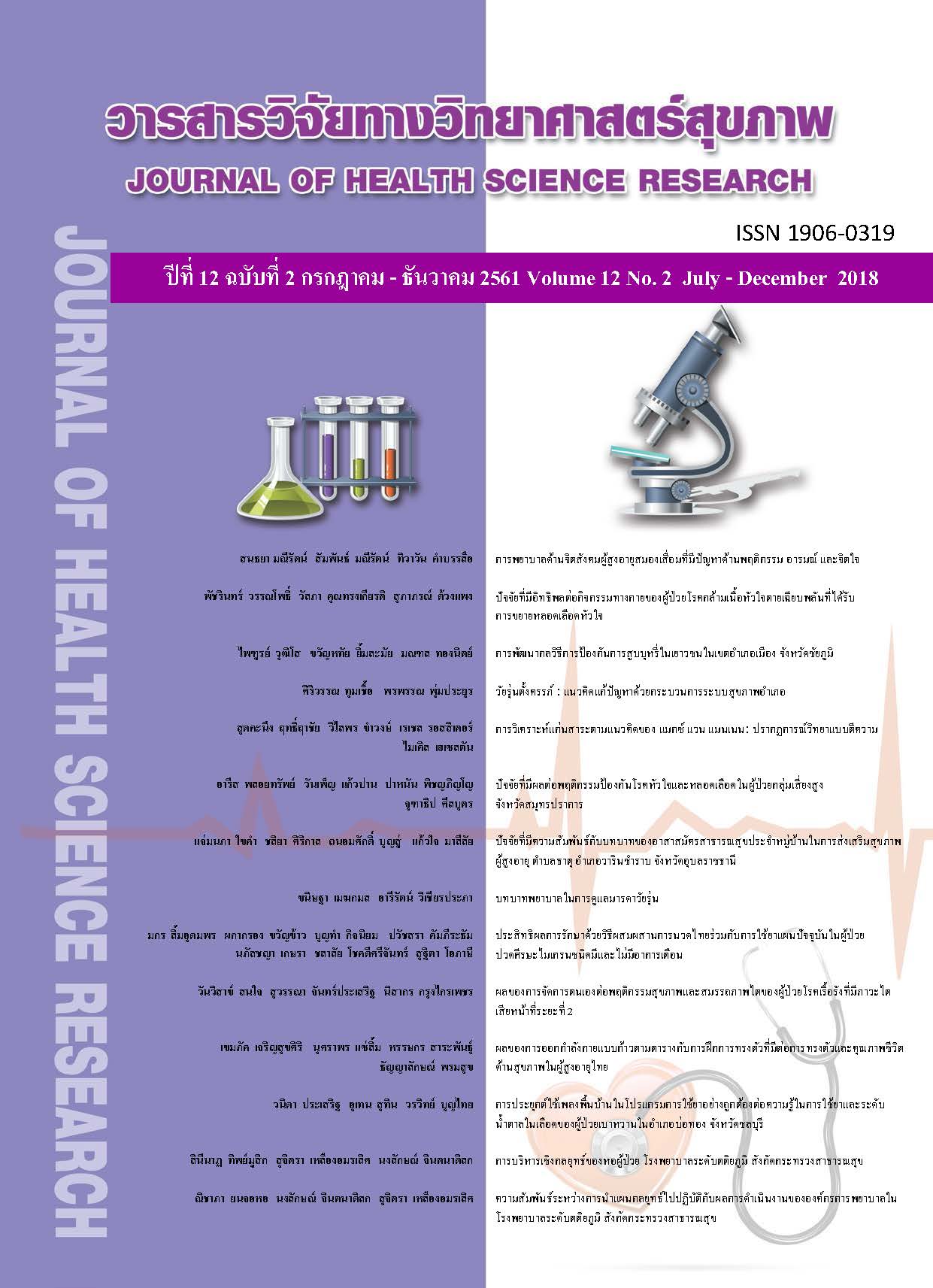ความสัมพันธ์ระหว่างการนำแผนกลยุทธ์ไปปฏิบัติกับผลการดำเนินงานของ องค์กรการพยาบาล ในโรงพยาบาลระดับตติยภูมิ สังกัดกระทรวงสาธารณสุข
Main Article Content
บทคัดย่อ
การวิจัยครั้งนี้มีวัตถุประสงค์ เพื่อศึกษาความสัมพันธ์ระหว่างการนำแผนกลยุทธ์ไปปฏิบัติกับผลการดำเนินงานขององค์กรการพยาบาล ในโรงพยาบาลระดับตติยภูมิ สังกัดกระทรวงสาธารณสุข กลุ่มตัวอย่างเป็น ผู้บริหารทางการพยาบาล จำนวน 252 คน ใช้วิธีการสุ่มตัวอย่างแบบมีระบบ เครื่องมือที่ใช้ในการวิจัย คือ แบบสอบถามการนำแผนกลยุทธ์ไปปฏิบัติ มีค่าความเที่ยง .94 และแบบสอบถามผลการดำเนินงาน มีค่าความเที่ยง .89 ใช้สถิติเชิงพรรณนา ได้แก่ ความถี่ ร้อยละ ค่าเฉลี่ย ส่วนเบี่ยงเบนมาตรฐาน และสัมประสิทธิ์สหสัมพันธ์แบบเพียร์สัน
ผลการวิจัย พบว่า ค่าเฉลี่ยคะแนนการนำแผนกลยุทธ์ไปปฏิบัติ และผลการดำเนินงานขององค์กรการพยาบาล อยู่ในระดับมาก ( = 3.96, SD = .40;
= 3.59, SD = .39) ตามลำดับ การนำแผนกลยุทธ์ไปปฏิบัติมีความสัมพันธ์เชิงบวกกับผลการดำเนินงานขององค์กรการพยาบาล (r=.61, p<.01) อย่างมีนัยสำคัญทางสถิติที่ระดับ .01 จากผลการวิจัยทำให้ได้องค์ความรู้ในการนำแผนกลยุทธ์ไปปฏิบัติในองค์กรการพยาบาล โดยผู้บริหารทางการพยาบาลควรมีการเตรียมองค์กรเกี่ยวกับทักษะการบริหารจัดการการลงทุนด้านบุคลากร การตอบสนองต่อคู่แข่ง การมุ่งเน้นผลการปฏิบัติงานให้บรรลุเป้าหมาย และการสร้างความแตกต่างในการบริการพยาบาล เพื่อให้ผลการดำเนินงานขององค์กรการพยาบาลมีประสิทธิภาพมากขึ้น
Downloads
Article Details
บทความที่ได้รับการตีพิมพ์เป็นลิขสิทธิ์ของวิทยาลัยพยาบาลบรมราชชนนี จังหวัดนนทบุรี
ข้อความที่ปรากฏในบทความแต่ละเรื่องในวารสารวิชาการเล่มนี้เป็นความคิดเห็นส่วนตัวของผู้เขียนแต่ละท่านไม่เกี่ยวข้องกับวิทยาลัยพยาบาลบรมราชชนนี จังหวัดนนทบุรี และคณาจารย์ท่านอื่น ในวิทยาลัยฯ แต่อย่างใด ความรับผิดชอบองค์ประกอบทั้งหมดของบทความแต่ละเรื่องเป็นของผู้เขียนแต่ละท่าน หากมีความผิดพลาดใด ๆ ผู้เขียนแต่ละท่านจะรับผิดชอบบทความของตนเองแต่ผู้เดียว
เอกสารอ้างอิง
2.Office of the Public Sector Development Commission. A guide to the explanation and guidelines for the royal decree on criteria and procedures for good governance. Bangkok: Sirabut Printing; 2003. (in Thai).
3.Vitayaaudome V. Organization and management. Bangkok: Thanachart Printing; 2007. (in Thai).
4.Kaplan RS, Norton DP. The strategy-focused organization: How balanced scorecard companies thrive in the new business environment. Boston, MA: Havard Business School Press; 2001.
5.Vorahan W. Strategic management in nursing. Journal of Nurses’ Association of Thailand, North-Eastern Division. 2013;31(4):6-15. (in Thai).
6.Porter ME. The competitive advantage: Creating and sustaining superior performance. New York: Free Press; 1985.
7.National Institute of Standards and Technology. Health Care Criteria for Performance Excellence [Internet]. 2009 [cited 2013 Sep 21]. Available from: https://www.nist.gov/baldrige/publications
8.Krejcie RV, Morgan DW. Determining sample size for research activities. Educ Psychol Meas. 1970;30(3):607-10.
9.Gupta KK, Attri JP, Singh A, Kaur H, Kaur G. Basic concepts for sample size calculation: Critical step for any clinical trials! Saudi J Anaesth. 2016;10(3):328-31.
10.Burns N, Grove SK. The practice of nursing research: Conduct, critique and utilization. 4thed. Philadelphia: W.B. Saunders; 2001.
11.Meehanpong P, Luangamornlert S, Changmai S. A causal model of patient unit performance in general hospital under Ministry of Public Health. Journal of The Royal Thai Army Nurse. 2015;16(1):78-86. (in Thai).
12.D’Souza SC, Sequeira AH. Application of MBNQA for service quality management and performance in healthcare organizations. International Journal of Engineering, Science and Technology. 2011;3(7):73-88.
13.Mutemi BM, Maina R, Wanyoike ND. Strategic management practices and performance of small scale enterprises in Kitui Town in Kenya. Int J Sci Commer Humanit. 2014;2(4):249-59.
14.Nursing Division, Office of the Permanent Secretary, Ministry of Public Health. Standard of nursing in hospital. 2nd ed. Nonthaburi: The War Veterans Organization Office of Printing Mill; 2007. (in Thai).


